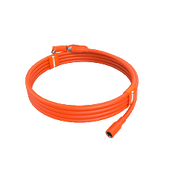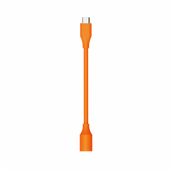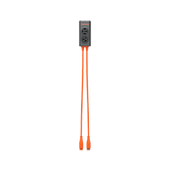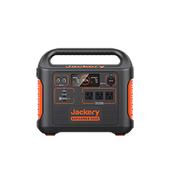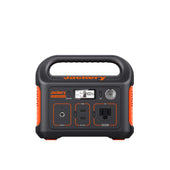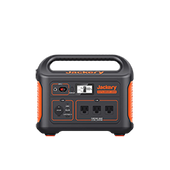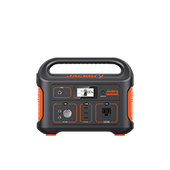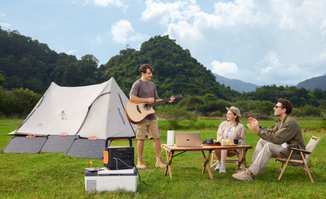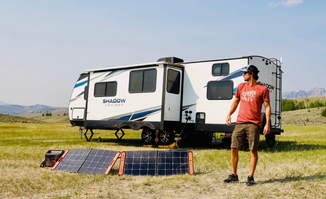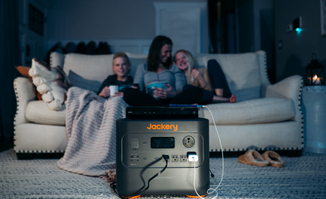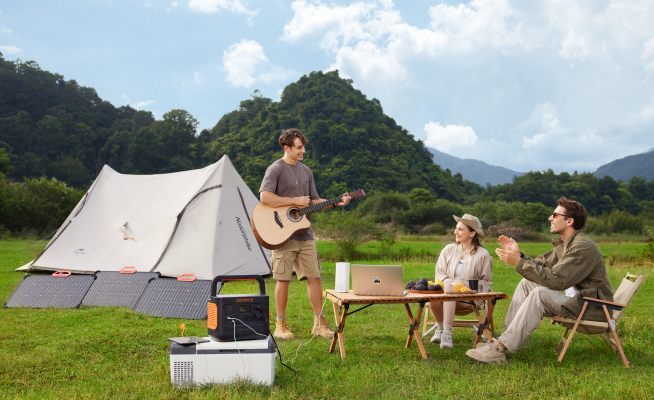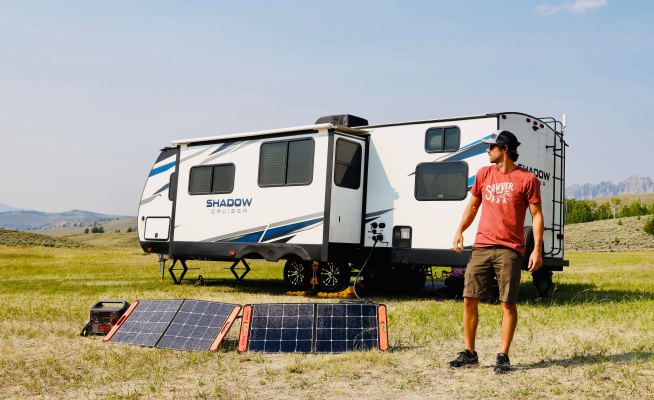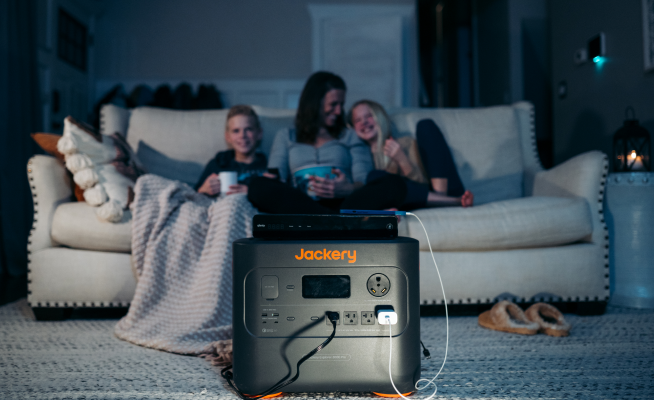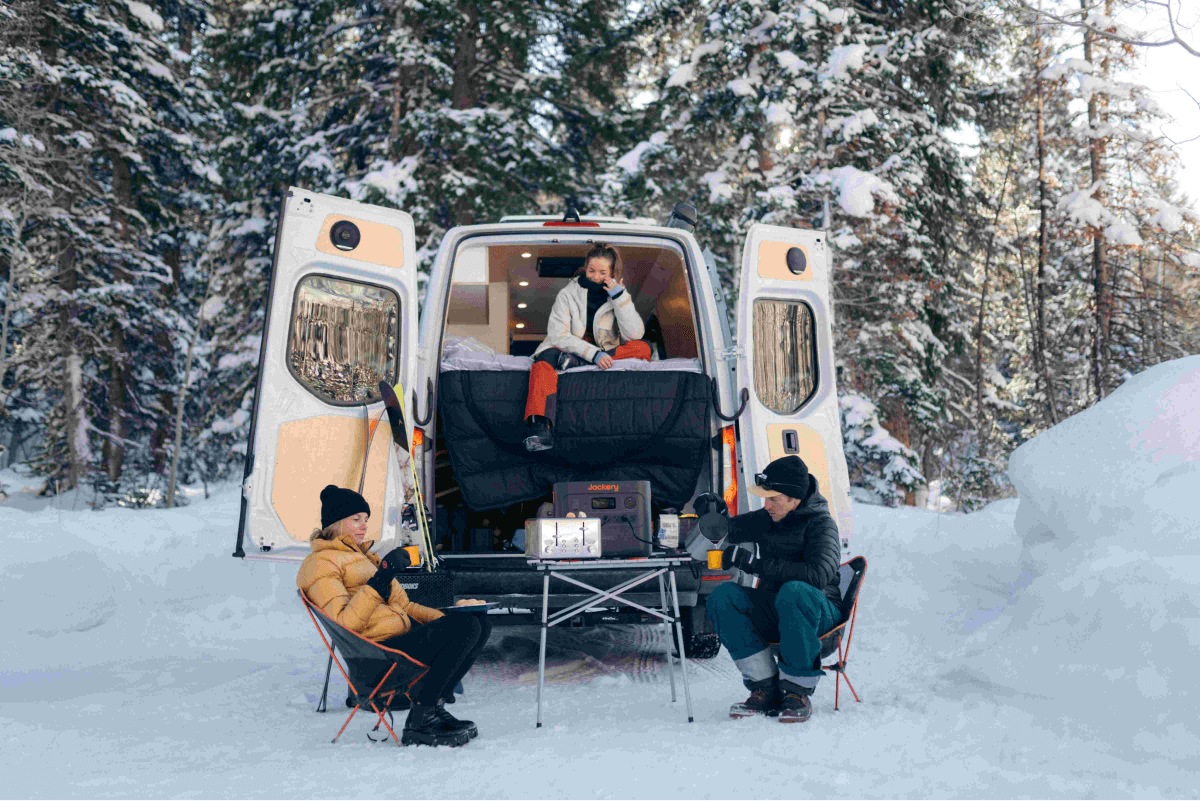For RV enthusiasts and campers, portable air conditioners are essential for maintaining a comfortable environment outdoors. These devices are ideal for cooling down in hot weather. Additionally, they provide a comfortable sleeping environment by reducing the humidity in humid weather conditions. To avoid being affected by changing weather conditions, temperature conditions remain under your control with a portable air conditioner.
Camping and RV enthusiasts challenge nature with portable air conditioners. It is enough to keep a mobile power station and mini air conditioner with you to keep your caravan or tent cool in Canada's variable weather conditions. Caravans have become a prevalent and cherished practice in the vast expanse of Canada, where the allure of scenic landscapes beckons enthusiasts. Popular destinations like Gros Morne National Park, Algonquin Provincial Park, and the Pacific Rim National Park witness a surge in caravan activity. These picturesque locations, known for their breathtaking beauty, attract avid campers seeking solace in nature's embrace.
Caravan culture requires you to find the comfort of your home while travelling, like a turtle carrying its home on its back. Portable air conditioners provide this comfort, allowing you to enjoy your journey by staying relaxed and comfortable in changing climate conditions. Moreover, portable air conditioners are products you can easily use anywhere if you provide energy. For example, you can easily use it in a camping tent with a Jackery portable power station. With the solar panels you install near your tent, you can run all the electrical devices you need, including the camping air conditioner, during long camping adventures. Canada's untouched natural wonders are now much more comfortable areas for outdoor enthusiasts and adventurous campers.
Understanding Portable Air Conditioners
Caravan enthusiasts and campers highly prefer portable air conditioners. Since these devices are small and portable, you can take them wherever you want and use them independently of mains electricity with a portable power station. These compact marvels redefine how we experience comfort during our travels and camping escapades. When we examine portable options, we encounter products with different capacities and features to meet different environments and expectations.
Diverse Types for Varied Needs
Portable air conditioners come in various types, each designed to cater to specific cooling requirements. Among the options are standalone units, window-mounted units, and evaporative coolers. Standalone units, often equipped with wheels for easy mobility, are the most common choice for RVs and camping due to their portability. Window-mounted units are designed to fit into standard window frames, making them suitable for specific RV configurations. Most portable products are not intended to provide into a place due to their shape; they are devices independent of mounting or connection equipment. On the other hand, evaporative coolers offer an eco-friendly alternative, utilizing water evaporation to cool the air.
By examining portable air conditioner options, we can determine what best suits our needs. For example, if our only need is cooling, all existing models meet this need. We need to increase our budget slightly if we want a device with different heating, cooling, and humidity control features. Factors such as the size of the area to be cooled, the presence of ventilation, and power supply compatibility play an essential role in making the right choice.
Wattage and Usage Scenarios
Wattage is a crucial metric in determining the cooling capacity of portable air conditioners. The power consumption of these units varies, influencing their suitability for different scenarios. Smaller units, such as mini air conditioners, generally operate within the range of 500 to 1000 watts, making them ideal for tents and smaller camping setups. These compact units balance efficiency and energy conservation, ensuring that portable power stations or power generators can power them.
Portable air conditioners with higher wattage become essential for larger RVs or more extensive camping setups. Units in this category may consume anywhere from 1000 to 5000 watts, providing robust cooling capabilities for larger living spaces. Understanding the wattage requirements of your chosen product is paramount to ensure compatibility with the power source, whether it be a standard electrical outlet, a portable power station, or a solar generator.
Navigating the diverse landscape of portable air conditioners involves aligning their capabilities with the unique demands of your travel or camping environment. Whether it's a compact unit for an intimate camping experience or a more robust solution for an expansive RV journey, the versatility of portable AC units ensures that comfort is never compromised on the road. The adaptability of these units to different power sources further enhances their appeal, making them indispensable companions for those seeking a cool and comfortable escape in the great outdoors.
Key Aspects When purchasing a portable air conditioner
Several technical specifications should be carefully considered to ensure that the chosen unit meets your needs and performs effectively in the local climate conditions. Here are key aspects to pay attention to:
1. BTU Rating (Cooling Capacity):
The British Thermal Unit (BTU) rating indicates the air conditioner's cooling capacity. Choosing a suitable BTU is crucial for efficient cooling. A higher BTU suits larger spaces, while smaller units are appropriate for tents or compact RVs.
2. Energy Efficiency Ratio (EER):
The EER is a measure of the air conditioner's energy efficiency. A higher EER indicates better energy efficiency, which is essential for minimizing electricity consumption and reducing energy bills. Look for units with a favourable EER rating.
3. Power Source Compatibility:
Verify the power source compatibility of the portable air conditioner. Some units operate on standard electrical outlets, while others are designed to be powered by portable power stations or solar generators. Ensure the chosen unit aligns with the power sources available during travel or camping trips.
4. Noise Level (Decibel Rating):
Consider the noise level of the portable air conditioner, especially if you plan to use it in close quarters or during the night. Lower decibel ratings indicate quieter operation, contributing to a more comfortable living or sleeping environment.
5. Portability and Weight:
Assess the portability features of the unit, such as wheels and handles, to facilitate easy movement. Additionally, consider the weight of the product, especially if you intend to transport it frequently or if weight is a concern in your RV or camping setup.
6. Ventilation Requirements:
Portable air conditioners require proper ventilation to expel hot air. Check the ventilation options and ensure they align with your living space. Some units come with window installation kits or flexible ducts, allowing for versatile placement.
7. Dehumidification Function:
Many portable air conditioners also function as dehumidifiers. If humidity control is crucial, look for units with effective dehumidification capabilities. This feature can enhance comfort and contribute to a healthier indoor environment.
8. Programmable Features and Controls:
Explore the programmable features and control options of the air conditioner. Timers, remote controls, and programmable settings can enhance convenience and allow you to customize the cooling experience based on your preferences.
9. Filter Type and Maintenance:
Consider the type of air filter used in the unit and its maintenance requirements. Easy-to-clean or washable filters are preferable for hassle-free upkeep, ensuring the air conditioner continues to operate efficiently.
10. Warranty and Customer Support:
Check the warranty coverage provided by the manufacturer. A more extended warranty period reflects confidence in the product's durability. Additionally, research the availability of customer support and service centers in Canada for potential future assistance.
By paying attention to these technical specifications, you can make an informed decision when selecting a portable air conditioner in Canada. Tailoring your choice to your requirements ensures you enjoy a comfortable and effective cooling solution during your RV travels or camping.

How to Choose the Right Portable Air Conditioner for RV and Camping Life
Choosing the right portable air conditioner becomes paramount in seeking comfort during RV journeys and camping escapades. This section will guide you through the intricacies of selecting an air conditioner tailored to your specific needs, ensuring a relaxed and enjoyable experience on the road.
RVs come in various shapes and sizes, each catering to distinct preferences and lifestyles. From compact camper vans to spacious motorhomes, the diversity in RV types necessitates a nuanced approach to selecting the appropriate portable air conditioner.
Tents
Camping enthusiasts can benefit from compact, lightweight mini air conditioners designed for tents. With a lower BTU value, typically 1000 to 5000 BTUs, these units offer a refreshing breeze without compromising the portability and simplicity essential for outdoor adventures.
Camper Vans
Opting for a portable air conditioner with lower power consumption is critical for compact camper vans, where space is a precious commodity. Units with a power range between 5000 and 7000 BTUs efficiently cool these smaller spaces without overwhelming the limited square footage.
Travel Trailers and Fifth Wheels
Mid-sized RVs, such as travel trailers and fifth wheels, offer more room for maneuverability. Here, a portable air conditioner with a power range of 8000 to 12000 BTUs strikes the right balance. This power level ensures effective cooling throughout the extended living spaces characteristic of these RV types.
Motorhomes
Large motorhomes, providing a home on wheels, demand robust cooling solutions. Portable air conditioners with a power range of 13000 to 15000 BTUs become essential for effectively regulating the temperature in these expansive mobile residences.
How Does Jackery's Product Suitable for Portable Air Conditioners
As Jackery, we aim to design our portable generators as multifunctional, easy-to-carry, and use products that meet different needs. Jackery Solar Generator 2000 Plus and Jackery Solar Generator 3000 Pro redefine off-grid living possibilities by offering a harmonious blend of solar charging capabilities, unparalleled portability, and versatile outdoor applications. With these devices, you can operate high-capacity portable air conditioners for hours. An excellent choice for RV enthusiasts and campers.
Solar Charging Prowess
Both the Jackery Solar Generator 2000 Plus and Jackery Solar Generator 3000 Pro are equipped with advanced solar charging technology, allowing users to harness the sun's energy and convert it into a reliable power source. Including solar panels amplifies their eco-friendly credentials, offering a sustainable and off-grid energy solution.
On-the-Go Portability
We at Jackery design Jackery generators that boast exceptional portability with the modern adventurer in mind. The portable design with pull rods and wheels allows integration into various outdoor scenarios, from camping escapades to RV journeys. The ease of transport ensures that your power source is as agile as your explorations, eliminating the constraints of traditional power outlets.
Versatile Outdoor Applications
The Jackery Solar Generators extend beyond mere power provision. Their versatile design accommodates an array of outdoor applications, amplifying the convenience of off-grid living. From charging electronic devices to powering essential appliances, these generators become indispensable companions for those embracing a life unbound by traditional power sources.
Portable Air Conditioners
A crucial component of the modern nomad's comfort arsenal, portable air conditioners redefine the possibilities of temperature control within RVs and camping setups. The Jackery Solar Generator 2000 Plus and Jackery Solar Generator 3000 Pro seamlessly integrate with these cooling devices, ensuring a refreshing escape from the outdoor elements.
Selecting the Right Model
Choosing the most suitable Jackery solar power generator for your specific RV or camping requirements is pivotal. Factors such as the size of your RV, power needs, and the duration of your outdoor escapade are crucial in determining the ideal match. Jackery Solar Generator 2000 Plus may be the perfect companion for smaller setups, while the Jackery Solar Generator 3000 Pro caters to more considerable power demands.
 Conclusion
Conclusion
Jackery Solar Generators redefine comfort on RV journeys and camping escapades. Picture this: a compact, eco-friendly solution that ensures comfort and aligns with sustainable practices. Embark on a journey where the sweltering heat is tamed, and your adventure knows no bounds. Dive into the world of Jackery Solar Generators and power your portable air conditioners – your gateway to a refreshingly cool and off-grid exploration.
Related Articles:
Solar AC: Can Solar Generator Run An Air Conditioner






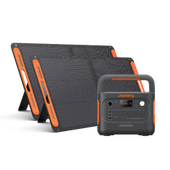


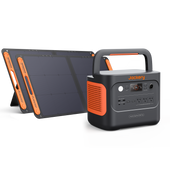

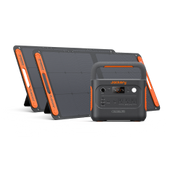
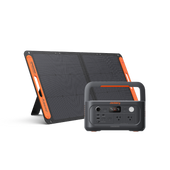
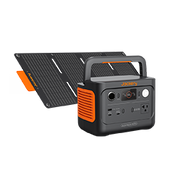
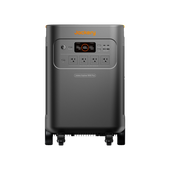
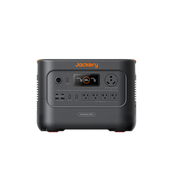
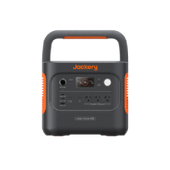
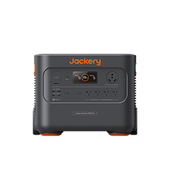
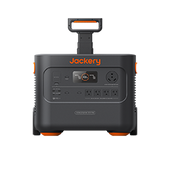

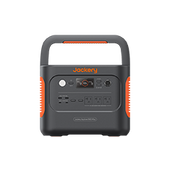
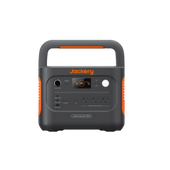
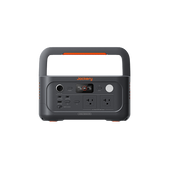

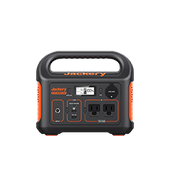
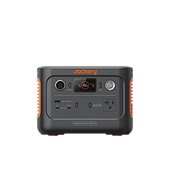
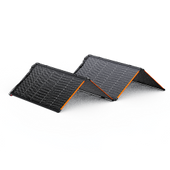
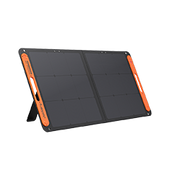

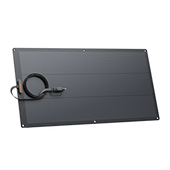
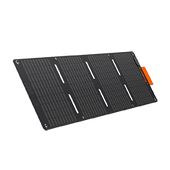
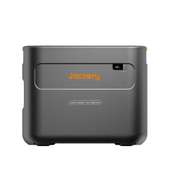
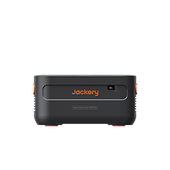
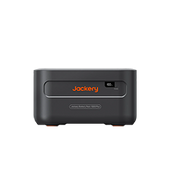
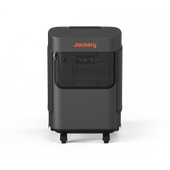
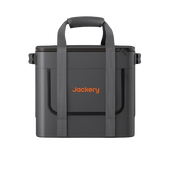
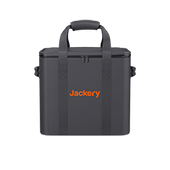
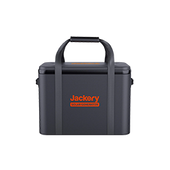
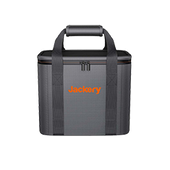
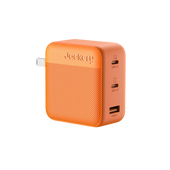
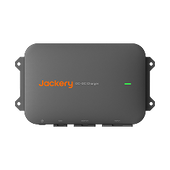
![[Add-on] Jackery Manual Transfer Switch for Explorer 5000 Plus](http://ca.jackery.com/cdn/shop/files/add-on-jackery-manual-transfer-switch-for-5000-plus-240V.webp?v=1757043692&width=170)
